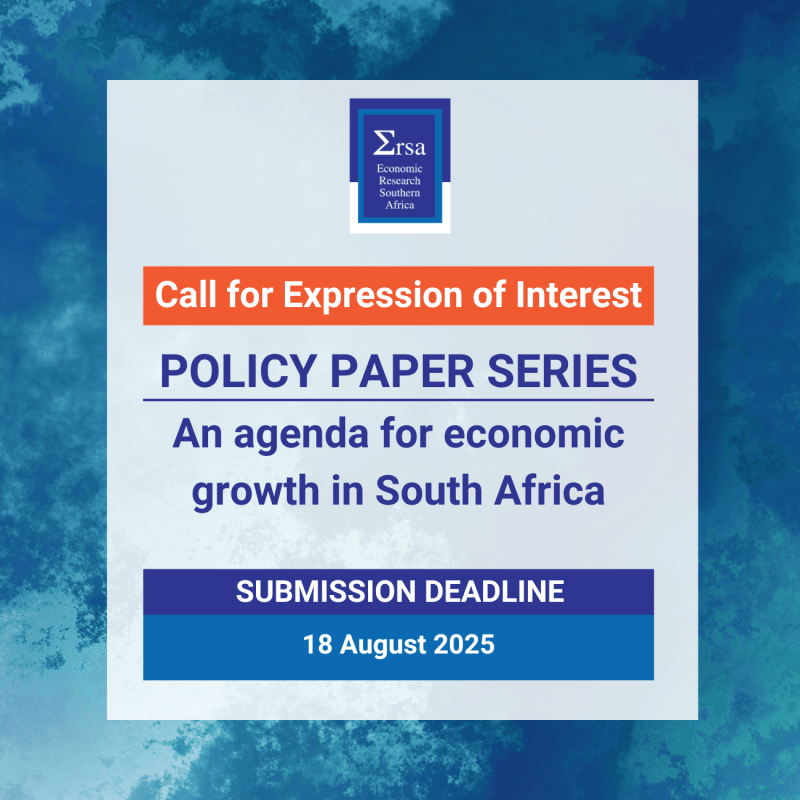South Africa’s economic growth has averaged only 0.7% per year over the past decade—well below the rate of population growth. This has led to a steady decline in GDP per capita, alongside persistently high unemployment, which—at 32.5% (narrow definition)—remains among the highest in the world and continues to trend upward.
Despite numerous government reforms—including Operation Vulindlela and recent strides in reducing load-shedding—South Africa’s economic growth remains persistently low. While the structural reforms under Operation Vulindlela are critical, they are unlikely to be sufficient on their own to catalyse the level of economic growth the country urgently requires.
In recent months, both the World Bank and the OECD have released in-depth reports outlining key constraints to and opportunities for growth. Building on this work, Economic Research Southern Africa (ERSA) is commissioning a series of policy papers that will deepen the analysis and extend the agenda to include additional areas critical to South Africa’s economic performance.
The goal of this series is to contribute toward a research-based, actionable growth agenda for South Africa—providing short-, medium-, and long-term policy recommendations to support effective policymaking and promote sustainable economic development.
We are interested in papers covering the following policy areas:
Mining – Macroeconomic Stability – Financial Stability and Institutions – Manufacturing – Education, skills and human capital – Health – Openness to Trade and Foreign Direct Investment – Urban Economic Policy – Foreign Direct Investment – Competition Policy – Physical Infrastructure – Digital Infrastructure and ICT Policy – Innovation (R&D, Technology Diffusion and Patents) – Transport Policy and Regulation – Governance and Institutions – Tax System Efficiency – Other policy areas (suggestions welcome)
Please note that these are broad areas and authors are also welcome to propose sub-areas.
Researchers wishing to participate are invited to submit the following:
- Curriculum Vitae detailing relevant research experience. If applicable, please indicate the commissioning institution for any policy-related research.
- Links to published research, including academic publications and/or work prepared for an informed policy audience.
- Cover letter, clearly indicating: The thematic area(s) or sub-area(s) you are interested in; Relevant experience and research expertise; Any previous policy engagement in the selected area(s); Proposed research questions
ERSA particularly welcomes proposals that incorporate early-career researchers and promote skills transfer.
To ensure quality and credibility, lead authors must meet the following requirements:
- Minimum of a Master’s degree in Economics or a closely related discipline
- At least 10 years of research experience
- A demonstrated portfolio of work in the relevant policy area
Researchers selected to contribute to the series will be expected to deliver:
- A policy paper (see structure and scope below)
- A presentation at a closed peer-review workshop
- Participation in an ERSA webinar or seminar, if requested
Compensation:
ERSA will pay R165 000 per paper, inclusive of all work associated with drafting, revising, and presenting the research.
Each policy paper should develop a well-founded, evidence-based set of policy recommendations aimed at addressing growth and employment challenges.
The papers must include:
- Overview of the Current Context
A concise description of the sector/theme’s structural features, performance trends (with descriptive statistics), and institutional/policy backdrop. - Literature Review
Summary of relevant theoretical and empirical findings to inform the analysis. Lessons from relevant countries or regions that have faced similar challenges. - Diagnosis of Growth and Employment Constraints
Identification of sector-specific barriers to productivity and employment.
Tip: Use the OECD’s “Foundations for Growth and Competitiveness” where appropriate. - Opportunities for Growth, Job Creation and Reform
Assessment of untapped potential, reform levers, and market or institutional opportunities.
ERSA Policy Papers are standalone reports, typically 5,000–10,000 words in length, drawing on academic research, grey literature, secondary data and descriptive analysis to produce clear, policy-relevant analysis.
These papers aim to bridge academic insight and policy application by:
- Proposing practical policy solutions to pressing economic challenges, and/or
- Evaluating the implications of existing or proposed policies and suggesting ways to enhance their impact
If you are interested in contributing to this series, please complete the form below and submit all required materials by 18 August 2025. Should you have any queries, please email Bradley Kent.



